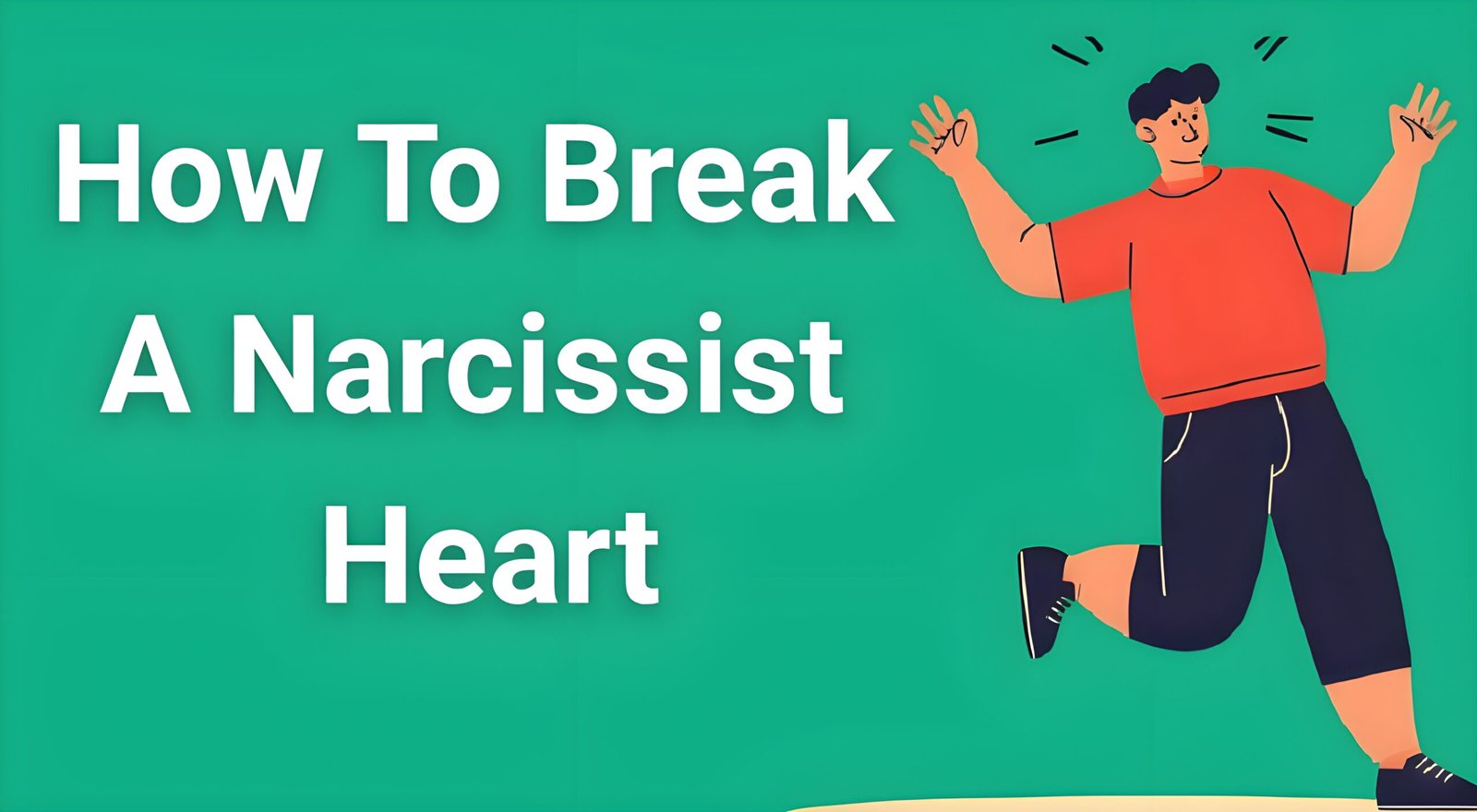Understanding how to break a narcissist heart isn’t about revenge—it’s about reclaiming your power and protecting your emotional well-being. When you’re trapped in the exhausting cycle of narcissistic manipulation, learning these psychology-backed strategies can be your path to freedom.
- Understanding the Narcissistic Heart: What You’re Really Breaking
- 7 Power Moves That Actually Break a Narcissist’s Heart
- The Science Behind Why These Strategies Work
- What to Expect When You Break a Narcissist’s Heart
- Protecting Yourself During the Process
- Signs That Your Strategies Are Working
- Common Mistakes to Avoid
- Rebuilding After Breaking Free
- When Professional Help Is Necessary
- Frequently Asked Questions
- Conclusion: Your Journey to Freedom Starts Now
If you’ve been wondering how to break a narcissist heart, you’re likely dealing with someone who has systematically undermined your self-worth, manipulated your emotions, and left you feeling powerless. The term “breaking their heart” might seem harsh, but what you’re really seeking is a way to emotionally disconnect from their control and regain your autonomy.
Understanding narcissistic behavior is crucial before attempting any strategy. Narcissists operate from a place of fragile ego disguised as grandiosity. Their “heart”—if we can call it that—is actually a complex web of deep insecurities, fear of abandonment, and desperate need for control. When you know how to break a narcissist heart, you’re essentially learning how to disrupt their power source.
Understanding the Narcissistic Heart: What You’re Really Breaking
Before diving into the strategies, it’s essential to understand what constitutes a narcissist’s emotional core. Unlike emotionally healthy individuals who can form genuine connections, narcissists operate from a place of emotional emptiness. Their “heart” is actually a sophisticated defense mechanism designed to protect them from feelings of worthlessness and shame.
The narcissistic heart feeds on three primary sources: narcissistic supply (attention and admiration), control over others, and the illusion of superiority. When you learn how to break a narcissist heart, you’re targeting these core needs that keep them emotionally dependent on others.
Narcissists experience love differently than emotionally healthy people. What they call “love” is often possession, control, or the enjoyment they get from having power over someone. This fundamental difference is why traditional relationship advice rarely works with narcissistic individuals.
The Psychology Behind Narcissistic Attachment
Research in psychology reveals that narcissists form what are called “narcissistic attachments” rather than genuine emotional bonds. These attachments are based on what the other person can provide them—validation, control, or enhancement of their self-image—rather than mutual care and respect.
Understanding this distinction is crucial when learning how to break a narcissist heart. You’re not actually breaking a capacity for love; you’re disrupting their source of narcissistic supply and control. This realization can be both liberating and empowering for those trapped in narcissistic relationships.
7 Power Moves That Actually Break a Narcissist’s Heart
1. Master the Art of Emotional Indifference
The most devastating blow to a narcissist’s emotional system is complete indifference. When you stop reacting to their provocations, drama, and manipulation tactics, you effectively cut off their primary source of narcissistic supply.
Emotional indifference means responding to their behavior with the same energy you’d give to a stranger asking for directions. No anger, no hurt, no emotional investment—just polite, detached neutrality. This approach works because narcissists thrive on emotional reactions, whether positive or negative.
Practice phrases like “That’s interesting,” “I see,” or “Okay” when they try to provoke you. Your calm, uninterested responses will confuse and frustrate them far more than any emotional outburst ever could.
The key to mastering emotional indifference is understanding that their behavior is about them, not you. When you truly internalize this truth, maintaining emotional distance becomes much easier.
2. Implement Strategic No Contact
No contact isn’t just about avoiding someone—it’s about systematically removing yourself from their sphere of influence. When executed properly, this strategy is perhaps the most effective way to break a narcissist heart because it removes their primary target for manipulation.
True no contact means eliminating all forms of communication: phone calls, texts, emails, social media interactions, and even contact through mutual friends. This complete absence creates a psychological void that narcissists struggle to fill.
The effectiveness of no contact lies in its ability to disrupt the narcissist’s sense of control. They can’t manipulate what they can’t reach, and they can’t feed off emotions they can’t provoke. This deprivation of narcissistic supply often leads to what experts call “narcissistic collapse.”
During the initial stages of no contact, expect them to escalate their attempts to reconnect through various manipulation tactics. This period, known as “hoovering,” is when they’ll try everything from fake emergencies to grand romantic gestures to pull you back in.
Many people who successfully implement no contact report that they needed additional support during this challenging period. Resources like specialized workbooks for trauma bond recovery can provide structured guidance for maintaining boundaries when emotional manipulation intensifies.
3. Set Impenetrable Boundaries
Boundaries are your emotional firewall against narcissistic manipulation. When you consistently enforce clear, non-negotiable limits, you remove their ability to exploit your vulnerabilities and emotional triggers.
Effective boundaries with narcissists must be concrete and enforceable. Instead of saying “Don’t treat me badly,” specify exactly what behavior is unacceptable and what the consequences will be. For example: “If you raise your voice at me, I will leave the room immediately.”
The most important aspect of boundary setting with narcissists is following through on your stated consequences. They will test your boundaries repeatedly, and any inconsistency in enforcement will be seen as an opportunity to regain control.
Written boundaries can be particularly effective because they eliminate the possibility of gaslighting about what was agreed upon. Document your boundaries and the consequences for violating them, then refer to this document when needed.
4. Starve Them of Narcissistic Supply
Narcissistic supply is the attention, admiration, and emotional reactions that fuel a narcissist’s ego. Learning how to break a narcissist heart often comes down to understanding how to systematically cut off this supply.
Stop providing praise, attention, or emotional reactions to their behavior. This includes both positive supply (compliments, admiration) and negative supply (arguments, emotional outbursts, pleading). Any reaction feeds their need for control and validation.
Refuse to participate in their drama. When they create chaos, don’t try to fix it, don’t take responsibility for it, and don’t allow it to affect your emotional state. Simply observe their behavior as you would watch a movie—interesting but not personally relevant.
Redirect your energy toward your own goals and relationships. The time and emotional investment you previously gave to managing their moods and behavior should now be focused on rebuilding your own life and connections.
5. Expose Their False Image
Narcissists invest enormous energy in maintaining a false public persona. One of the most effective ways to break a narcissist heart is to allow their true behavior to become visible to others, particularly those whose opinions they value.
This doesn’t mean launching a campaign to destroy their reputation. Instead, it means stopping your efforts to protect their image when they behave badly. No more making excuses for their behavior or covering up their mistakes.
Document their behavior patterns with dates, times, and specific incidents. This documentation serves multiple purposes: it validates your own experiences, provides evidence if needed for legal purposes, and helps you maintain clarity about the reality of their behavior.
Share your experiences with trusted friends and family members. Narcissists often isolate their victims by convincing them that no one would believe their stories. When you break this isolation, you weaken their psychological hold over you.
Sometimes, professional analysis of your specific situation can help you identify patterns you might not see clearly yourself. Expert evaluation can provide the validation and clarity needed to move forward confidently.
6. Reclaim Your Personal Power
The foundation of learning how to break a narcissist heart lies in rebuilding your own sense of personal power and worth. Narcissists systematically undermine their victims’ self-confidence to maintain control, so reclaiming this power directly threatens their ability to manipulate you.
Start by reconnecting with your own values, goals, and interests. Narcissists often pressure their victims to abandon personal pursuits in favor of focusing entirely on the narcissist’s needs and wants. Rebuilding your independent identity is crucial for emotional freedom.
Develop a strong support network outside of the narcissistic relationship. This might include reconnecting with old friends, joining support groups, or building new relationships with people who appreciate your authentic self.
Practice making decisions based on your own needs and values rather than trying to avoid the narcissist’s negative reactions. Each decision you make independently weakens their psychological control over you.
7. Refuse to Be Their Emotional Dumping Ground
Narcissists frequently use their victims as repositories for their negative emotions, projecting their own anger, shame, and insecurity onto others. Learning to refuse this role is essential for protecting your emotional well-being and disrupting their control patterns.
When they attempt to make you responsible for their emotions, clearly state that their feelings are their responsibility to manage. Use phrases like “That sounds difficult for you” or “I’m sure you’ll figure out how to handle that.”
Avoid the temptation to fix their problems or soothe their emotional turmoil. This caretaking behavior, while well-intentioned, actually enables their dysfunction and reinforces their belief that others exist to serve their emotional needs.
Develop your own emotional regulation skills to avoid being pulled into their emotional chaos. Techniques like deep breathing, grounding exercises, and mindfulness can help you maintain emotional stability when they attempt to transfer their negative emotions to you.
The Science Behind Why These Strategies Work
Understanding the psychological mechanisms that make these strategies effective can help you implement them more confidently and consistently. Research in narcissistic personality disorder reveals specific vulnerabilities that these approaches target.
Narcissists have what psychologists call “fragile high self-esteem.” While they project confidence and superiority, their self-worth is actually extremely dependent on external validation. When you remove this validation through indifference and boundary setting, you trigger what researchers call “narcissistic injury.”
The attachment style of narcissists is typically anxious-avoidant, meaning they simultaneously crave closeness and fear abandonment while being unable to form genuine intimate connections. No contact specifically targets this core fear while protecting you from their inability to connect authentically.
Studies on narcissistic supply show that narcissists experience withdrawal symptoms similar to addiction when their supply is cut off. This explains why they often escalate their behavior initially when you implement these strategies—they’re experiencing psychological withdrawal.
What to Expect When You Break a Narcissist’s Heart
When you successfully implement these strategies, the narcissist’s response will likely follow a predictable pattern. Understanding these phases can help you prepare mentally and maintain your resolve during challenging moments.
Phase 1: Escalation and Love Bombing
Initially, they may increase their efforts to regain control through a combination of love bombing (excessive affection and promises) and escalated manipulation tactics. This phase can be particularly difficult because their attention might feel validating after a period of conflict.
They might promise to change, seek therapy, or make grand gestures to prove their love. Remember that this behavior is driven by their need to regain control, not by genuine recognition of their harmful patterns.
Phase 2: Rage and Punishment
When love bombing fails, many narcissists move into a phase of rage and punishment. They might spread rumors, try to turn mutual friends against you, or escalate their attempts at control through various means.
This phase is actually a positive sign that your strategies are working. Their anger indicates that they’re losing their hold over you and feeling the impact of reduced narcissistic supply.
Phase 3: Discarding and Finding New Supply
Eventually, most narcissists will move on to find new sources of narcissistic supply. While this might feel painful initially, it’s actually the desired outcome. Their departure means you’ve successfully broken their emotional dependency on you.
During this phase, focus on your own healing and recovery. The end of a narcissistic relationship often involves processing complex trauma, and professional support can be invaluable during this time.
Structured recovery programs, such as trauma bond recovery workbooks, can provide day-by-day guidance for navigating the complex emotions that arise when leaving a narcissistic relationship.
Protecting Yourself During the Process
Learning how to break a narcissist heart can trigger intense responses that may put you at risk emotionally, financially, or even physically. Developing a comprehensive protection plan is essential before implementing these strategies.
Safety Planning
If you live with the narcissist or share children, develop a detailed safety plan that includes secure places to go, important documents stored safely, and a support network that understands your situation.
Consider consulting with professionals who understand narcissistic abuse patterns. Legal advice may be necessary if you’re married, have children together, or share significant assets.
Emotional Protection
Prepare for emotional manipulation tactics such as gaslighting, blame-shifting, and emotional blackmail. Having a clear understanding of these tactics makes them less effective when encountered.
Maintain connections with people who validate your experiences and support your decision to establish boundaries. Isolation is one of the narcissist’s most effective tools, so protecting your support network is crucial.
Financial Protection
If you share financial resources, begin securing your financial independence before implementing these strategies. This might include opening separate accounts, understanding your credit status, and protecting important financial documents.
Sometimes the process of leaving a narcissistic relationship requires learning specific survival strategies for situations where immediate departure isn’t possible. Specialized resources can provide guidance for protecting yourself while still in contact with a narcissistic individual.
Signs That Your Strategies Are Working
Recognizing the signs that your approach is successfully disrupting their control can help you maintain motivation and adjust your strategies as needed.
Decreased Emotional Reactivity
As you become more emotionally detached from their behavior, you’ll notice that their attempts at manipulation have less impact on your mood and daily functioning. This is one of the strongest indicators that you’re breaking free from their psychological control.
Increased Desperation in Their Behavior
When narcissists feel their control slipping, they often become more desperate and obvious in their manipulation attempts. While this can be uncomfortable, it actually indicates that your boundaries are working.
Clarity About the Relationship
As the emotional fog of manipulation clears, you’ll likely gain unprecedented clarity about the true nature of your relationship. This clarity, while sometimes painful, is essential for maintaining your resolve and making healthy decisions.
Recovery of Personal Identity
You’ll begin to remember who you were before the relationship and start reconnecting with your own values, interests, and goals. This recovery of personal identity is perhaps the most important sign that you’re successfully breaking free.
Common Mistakes to Avoid
Even with the best intentions, there are several common pitfalls that can undermine your efforts to break free from narcissistic control.
Believing They Can Change
One of the most dangerous mistakes is believing that your changed behavior will inspire them to become a better person. While change is theoretically possible for anyone, narcissistic personality patterns are deeply entrenched and rarely change without intensive, specialized therapy that the narcissist actively seeks and commits to.
Seeking Closure or Explanation
Many people delay implementing these strategies because they want closure or a final explanation from the narcissist. Unfortunately, narcissists rarely provide genuine closure, and waiting for it often results in further manipulation and delayed healing.
Inconsistent Implementation
Partial implementation of these strategies often backfires because it shows the narcissist that your boundaries are negotiable. Consistency is crucial for success, even when maintaining boundaries feels difficult.
Underestimating Their Response
Failing to prepare for the intensity of their response to your changed behavior can lead to abandoning your strategies just when they’re beginning to work. Expect escalation and prepare accordingly.
Rebuilding After Breaking Free
Successfully learning how to break a narcissist heart is only the beginning of your recovery journey. The work of rebuilding your life and healing from narcissistic abuse requires ongoing attention and often professional support.
Processing Complex Trauma
Narcissistic abuse often results in complex trauma that affects your ability to trust, form relationships, and make decisions. Understanding this impact is crucial for effective healing.
Rebuilding Self-Worth
Years of systematic devaluation take time to overcome. Focus on developing a realistic, stable sense of self-worth that doesn’t depend on external validation.
Learning Healthy Relationship Patterns
Many survivors of narcissistic abuse need to learn what healthy relationships look like and how to recognize red flags in future relationships.
Developing Emotional Regulation Skills
Narcissistic abuse often disrupts your natural emotional regulation abilities. Learning to manage your emotions independently is crucial for long-term recovery.
When Professional Help Is Necessary
While many people can successfully implement these strategies independently, certain situations require professional intervention and support.
Consider seeking professional help if you’re experiencing symptoms of depression, anxiety, or post-traumatic stress that interfere with daily functioning. Therapists who specialize in narcissistic abuse recovery can provide targeted support for your specific situation.
If you’re co-parenting with a narcissist, family court specialists and therapeutic support can help you protect your children while managing necessary ongoing contact.
Sometimes, getting a professional analysis of your specific situation can provide the clarity and validation needed to move forward confidently. Expert evaluation can help you understand patterns you might not see clearly yourself and develop strategies tailored to your unique circumstances.
Frequently Asked Questions
Q: How long does it take to break a narcissist’s heart using these strategies?
A: The timeline varies depending on the severity of their narcissistic traits and how consistently you implement these strategies. Some people see results within weeks, while others may need several months of consistent boundary enforcement.
Q: What if the narcissist is a family member I can’t completely avoid?
A: For family situations, focus on modified contact with strict boundaries rather than complete no contact. Limit interactions to necessary communications and maintain emotional detachment during all encounters.
Q: Will these strategies work with a covert narcissist?
A: Yes, these strategies are effective with both overt and covert narcissists. Covert narcissists may respond with more subtle manipulation tactics, but the core principles remain the same.
Q: Is it normal to feel guilty when implementing these strategies?
A: Guilt is extremely common and often indicates that the strategies are working. Narcissists condition their victims to feel responsible for their emotions, so establishing boundaries naturally triggers guilt initially.
Q: Can a narcissist actually change if I use these strategies?
A: While these strategies may motivate some narcissists to seek help, change requires their genuine commitment to intensive therapy. Don’t implement these strategies with the goal of changing them—focus on protecting yourself.
Q: What if they threaten to hurt themselves when I set boundaries?
A: Threats of self-harm are serious manipulation tactics. Don’t let these threats control your behavior, but do contact appropriate authorities if you believe they’re genuinely at risk.
Conclusion: Your Journey to Freedom Starts Now
Learning how to break a narcissist heart is ultimately about breaking the chains that bind you to toxic patterns and reclaiming your power to live authentically. The seven strategies outlined here—emotional indifference, no contact, boundary setting, starving narcissistic supply, exposing false images, reclaiming personal power, and refusing to be an emotional dumping ground—provide a comprehensive framework for breaking free from narcissistic control.
Remember that implementing these strategies requires courage, consistency, and often significant support. The narcissist’s response may be intense initially, but this intensity often indicates that your boundaries are working effectively.
Your worth doesn’t depend on their approval, your peace doesn’t require their cooperation, and your happiness doesn’t need their participation. When you truly understand and live by these truths, you’ve not only learned how to break a narcissist heart—you’ve discovered how to heal your own.
The journey from victim to survivor to thriver is challenging but absolutely possible. Every boundary you set, every moment you choose your own well-being over their comfort, and every step you take toward your authentic self is a victory worth celebrating.
Your life beyond narcissistic abuse is waiting. The question isn’t whether you deserve freedom—you absolutely do. The question is whether you’re ready to claim it. Today can be the day you start breaking free from their hold and begin building the life you truly deserve.






